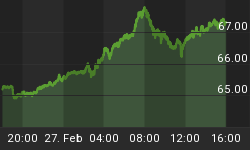As a general rule, the most successful man in life is the man who has the best information
The Fed has been dumping billions of dollars into the US markets each and every trading day since late 2010. Because of this massive money creation the dollar became much weaker.
Movements in the dollar influence commodity prices, commodity prices influence bonds, which then influence stocks:
- A falling weaker dollar pushes up the price of commodities, rising commodity prices tend to push bond prices lower. A falling dollar is bearish for bonds and stocks because it is inflationary
- A rising dollar is noninflationary so the rising dollar produces lower commodity prices. Lower commodity prices lead to lower interest rates and higher bond prices. Higher bond prices are bullish for stocks
- Commodity markets move in the same direction as Treasury bond yields and in the opposite direction of bond prices - bond prices and bond yields move in opposite directions
Today's strange market conditions (the dollar up, markets down) are temporary and are providing a huge buying opportunity. Here's why…As soon as the QE program, part 1 & 2, ended in June, the markets had to get by on a lot less money and liquidity - the effects of QE x 2 have worn off. The stock market and commodities are tanking while bond yields are making new lows - the dollar is getting stronger.
Today the dollar is up because the EU, and the world, have an acute shortage of dollars for the necessary bailouts and needed liquidity, the markets have already priced in a Western recession but do not know how the Greek situation is going to be resolved.
If Greece is allowed to default markets would plunge.
But, massive central bank bond buying will keep both the Italian and Spanish bond markets afloat. This would be perceived as the double threats of a systemic breakdown and a return to the 2008 global crisis significantly receding.
"We are in a fresh cyclical downturn within a structural slump/depression. We need global co-ordinated monetary action and the ECB must cut rates by 50 points. It made a terrible mistake by raising rates in July." ~ Andrew Roberts, credit chief at RBS
The EU will use its bailout fund, the European Financial Stability Facility (EFSF), to purchase bonds and recapitalize banks. French Finance Minister François Baroin and Olli Rehn, the European Union's head of monetary affairs, signalled that they were open to using "leverage" to expand the scope of the €440-billion ($611-billion) EFSF. The US Federal Reserve, Bank of England, Bank of Japan and the Swiss National Bank are all going to provide dollars to European banks - this will be very inflationary.
The US will also end its leading up to election time partisan politics, it's this author's belief the US will return to Quantitative Easing (QE) early in 2012, if not before, and initiate a massive stimulus program via an infrastructure maintenance and build program, the European Union will follow suit. All of this would be very positive for commodities
China, even if growth slows, is still predicted to grow at nine percent and the urbanization of both China and India and the astounding prospects of Africa are far from over.
"In terms of long-term structural trends, demand is now driven by an urbanization process that is far more structural than consensus generally believes. On our analysis, China is only 20 to 25 per cent along the path towards being a mature materials market and it may take at least six to nine years before demand intensity peaks." ~ Andrew Keen, Thorsten Zimmermann and Lourina Pretorius, analysts at HSBC
As an aside the business section of the China Daily newspaper had a lead story on the front page about 20 Lamborghini dealerships opening in China. Lamborghini sold 28 cars in 2007 and believe they will sell 300 in 2011 - they expect China to be their largest market in 2012. Ferrari expects to sell 600 vehicles and Porsche expects to sell more than 20,000 vehicles this year.
Conclusion
The sheer size of the European bailouts would be inflationary - a weaker US dollar - and a market return to "normal" would resolve the current uncertainty.
Today the dollar is up and commodities are down but more money creation, on a massive scale, an unprecedented level, is both necessary and coming. Inflation is "baked into the cake" for the foreseeable future. In today's fiat money driven economies deflation is simply unacceptable. When a government wants inflation they will get it.
This is bullish for commodities, the world's future supply of commodities are controlled by junior resource companies, they should be on every investors radar screen. Are resource juniors on your radar screen?
If not, maybe they should be.
Richard Mills does not own shares of any companies mentioned in this report.
If you're interested in learning more about the junior resource sector, bio-tech and technology sectors please come and visit us at www.aheadoftheherd.com
Site membership and our AOTH newsletter are free. No credit card or personal information is asked for.















